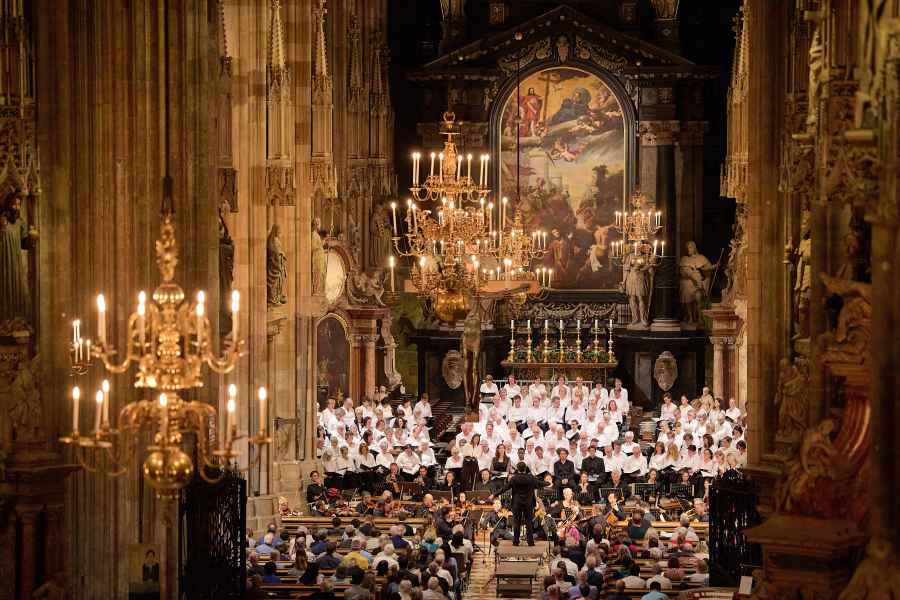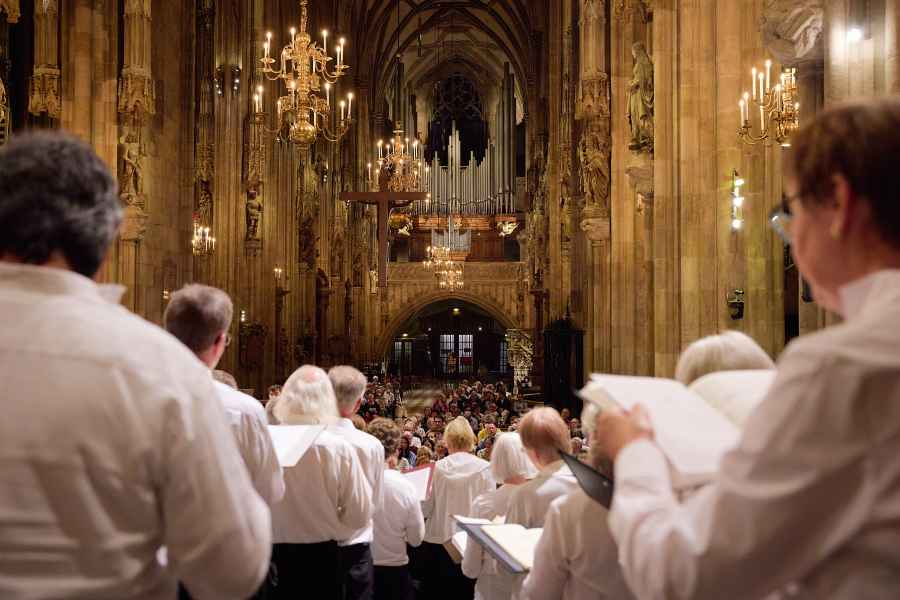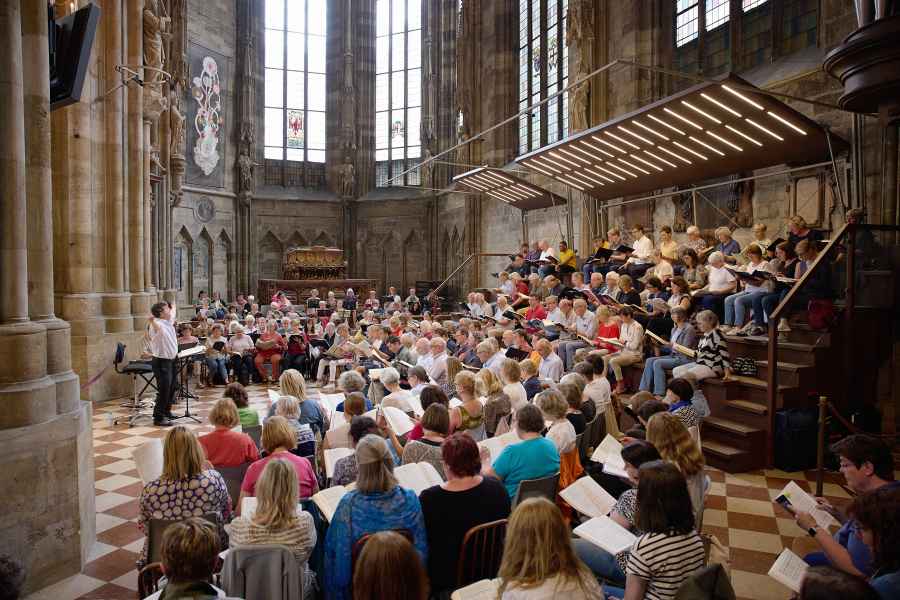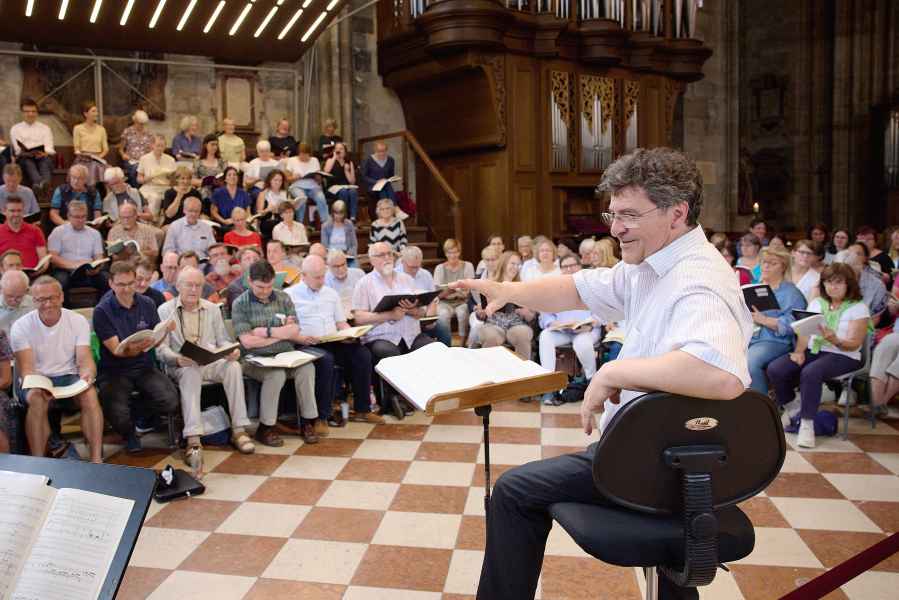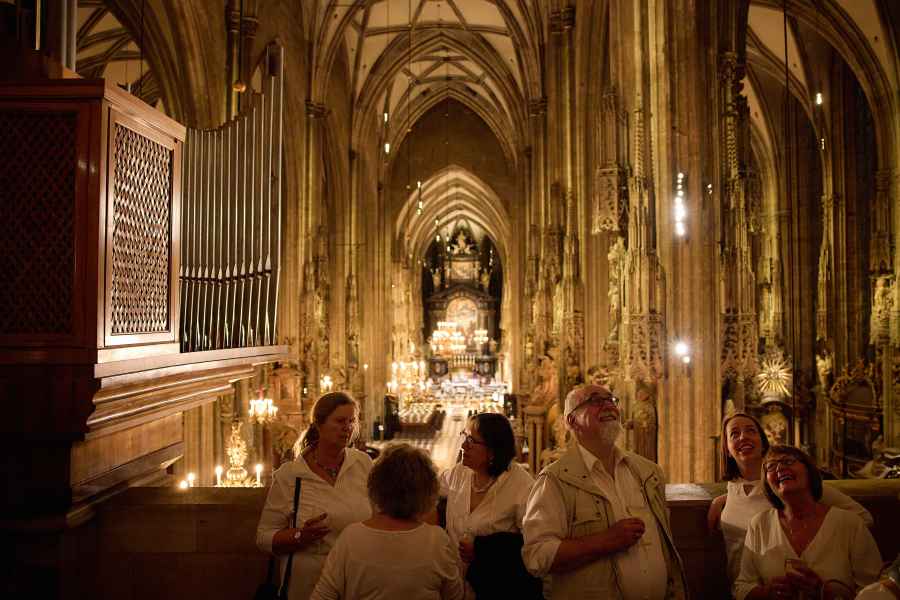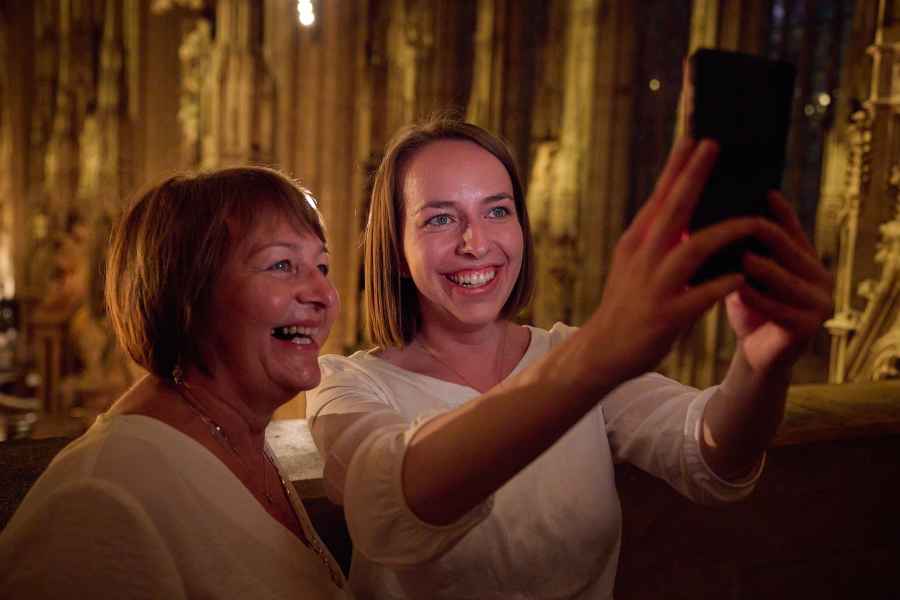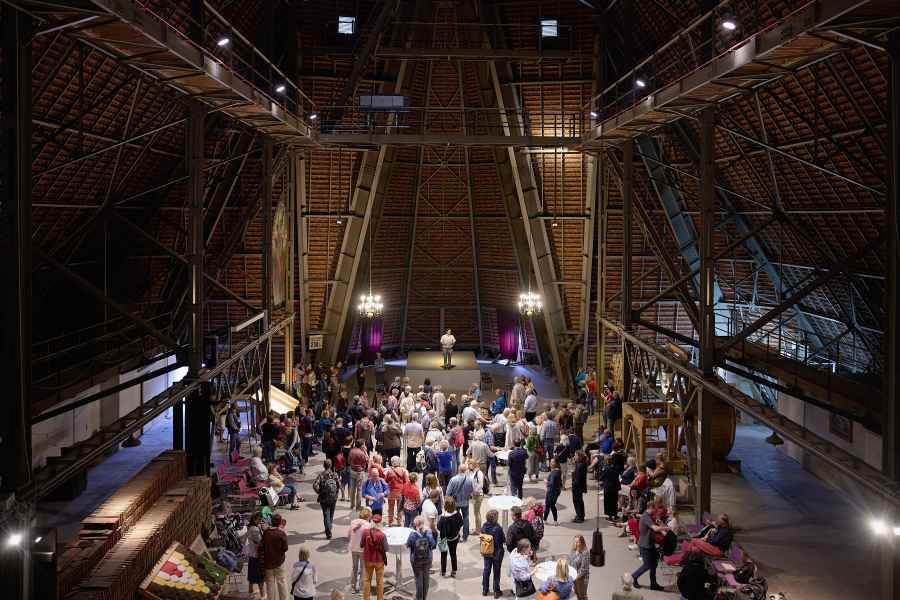Our Sing Along Concerts in Vienna and Salzburg offer individual singers and choirs the opportunity to perform an important work of choral music in Vienna’s St. Stephen’s Cathedral or Salzburg Cathedral in a professionally organized concert. For 18 years, individual amateur singers and choirs from all over the world come to Austria to be part of this unique Sing Along experience.
Under the direction of a renowned choirmaster you will be studying the relevant piece for several days in rehearsals during the Sing Along! Choir Festival. As part of the Sing Along! Festival Choir newly formed for each piece, you will then perform the work together with your fellow international singers, the Cathedral Orchestra and renowned soloists in a festive final concert in front of a broad audience in Vienna's St. Stephen’s Cathedral.
Meet The Artistic Directors
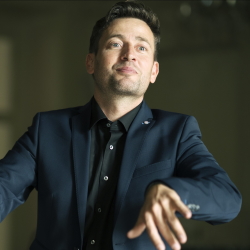
Artistic Director of the Sing Alongs in Vienna
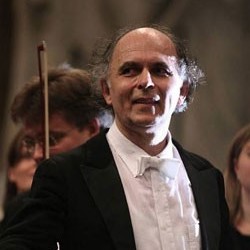
Artistic Director of Sing Alongs
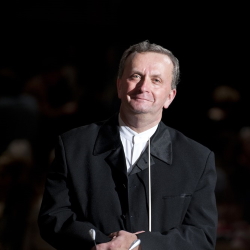
Sing Along! Gallery


















































































Dankeschön an Gerald Wirth
Dankeschön an Gerald Wirth

Gratulation an die SolistInnen
Gratulation an die SolistInnen

Überreichung der Jubiläums-Zertifikate
Überreichung der Jubiläums-Zertifikate

Überreichung der Jubiläums-Zertifikate
Überreichung der Jubiläums-Zertifikate

Überreichung der Jubiläums-Zertifikate
Überreichung der Jubiläums-Zertifikate




Totenprotokoll W. A. Mozart

Begräbnis W. A. Mozart

Hochzeit W. A. Mozart
W. A. Mozart: Requiem
3 to 5 July 2025 | St. Stephen's Cathedral, Vienna
Registration for "Mozart, Requiem" in Vienna is closed as the maximum number of participants has been reached!
Perform Mozart's Requiem together with a short composition by his companion and double jubilarian Antonio Salieri as a sing-along concert in St Stephen's Cathedral in Vienna. It is one of the best and most moving pieces of choral music. The Requiem contains the strong emotions that people experience in the face of death: Fear, anger, despair, sadness, hope, consolation.
At the Sing Along! Choir Festival, you will work on the pieces in workshops lasting several days under the direction of Erasmus Baumgartner and then perform them together with the Vienna Cathedral Orchestra and renowned soloists in a festive final concert in St. Stephen's Cathedral in Vienna.
Repertoire and Composers
Repertoire
W. A. Mozart: Requiem (KV 626, Süßmair Version)
When Wolfgang Amadé Mozart died on 5 December 1791, he left his Requiem in D minor (K. 626) unfinished. By the time of his death on 5 December 1791, he had only written down the opening movement of the Introit (Requiem aeternam) with all the orchestral and vocal parts. The following Kyrie and most of the Dies irae sequence (from the Dies irae to the Confutatis) were completed only in the vocal parts and the figured bass; in addition, some important orchestral parts (such as the trombone solo in the Tuba mirum, and more often the voice of the first violins) were briefly sketched. The last movement of the sequence, the Lacrimosa, broke off after eight bars and remained incomplete. The following two movements of the Offertory, the Domine Jesu Christe and the Hostias, were again elaborated in the vocal parts and partly in the continuo.
Through intermediaries acting for the eccentric Count Franz von Walsegg, Mozart was commissioned to compose a Requiem. The Count, who was an amateur musician and often commissioned works only to pass them off as his own composition (a practice that was widespread at the time), requested a Requiem to be performed in memory of his recently deceased wife. Mozart received half the payment in advance, so after Mozart's death his widow Konstanze was keen to have the work completed quickly and secretly by someone else so that she could deliver it as Mozart's composition and collect the remaining payment. At first she turned to Joseph Eybler. He worked on the orchestration of the movements from the Dies irae to the Lacrimosa, but then returned the commission.
The work was then entrusted to Franz Xaver Süßmayr, composer and pupil of Mozart, who was able to draw on Eybler's work for the orchestration. Süßmayr completed the orchestration of the Sequence as well as the Offertory, finished the Lacrimosa and composed further movements: Sanctus, Benedictus and Agnus Dei. Then he completed the Communio (Lux aeterna) by repeating the two opening movements, which Mozart had still composed himself, and underlaying them with the text of the Lux aeterna.
The completed composition, begun by Mozart and largely completed by Süssmayr, was given to Count Franz von Walsegg with Mozart's forged signature and dated 1792. The confusion surrounding the circumstances of this Requiem composition was largely spread by Mozart's widow Konstanze herself. Konstanze had a difficult task ahead of her: she had to keep the secret that Mozart had died before completing the composition so that she could claim the balance of the payment for the commissioned work. For a time, she had to keep secret that Süssmayr was involved with the composition in order to make Count Walsegg believe that he had Mozart's work in his hands. After receiving the balance of the fee, she had to promote the work as Mozart's composition in order to continue to use it as a source of income for publications and performances. During this phase, it was still important to make the public believe that Mozart had composed the entire work himself in order to extract higher sums from publishers and public performances. It is thanks to Konstanze that the first half-truths and myths began to circulate almost immediately after Mozart's death. She claimed that Mozart had declared that he was writing the Requiem for himself and that he had been poisoned. His condition deteriorated and he began to complain of painful swelling of his body and high fever. Despite all this, Mozart continued to work on the Requiem and even on the last day of his life he explained to his assistant how he intended to end the work. Even in biographies written shortly after Mozart's death, there are numerous inconsistencies that make it almost impossible to solve all the mysteries surrounding Mozart's last composition.
A. Salieri: Das Lob der Musik
As a short 5-minute additional piece, we will sing Antonio Salieri's "Das Lob der Musik" (In Praise of Music), as both the 200th anniversary of his death and his 275th birthday are commemorated in 2025. You will receive the score with your registration. There will be no overdubbing, but there will be a concert recording. However, Erasmus Baumgartner is already looking forward to rehearsing the work with the participants.
Antonio Salieri: „Das Lob der Musik“:
Composers
Wolfgang Amadeus Mozart (1756-1791)
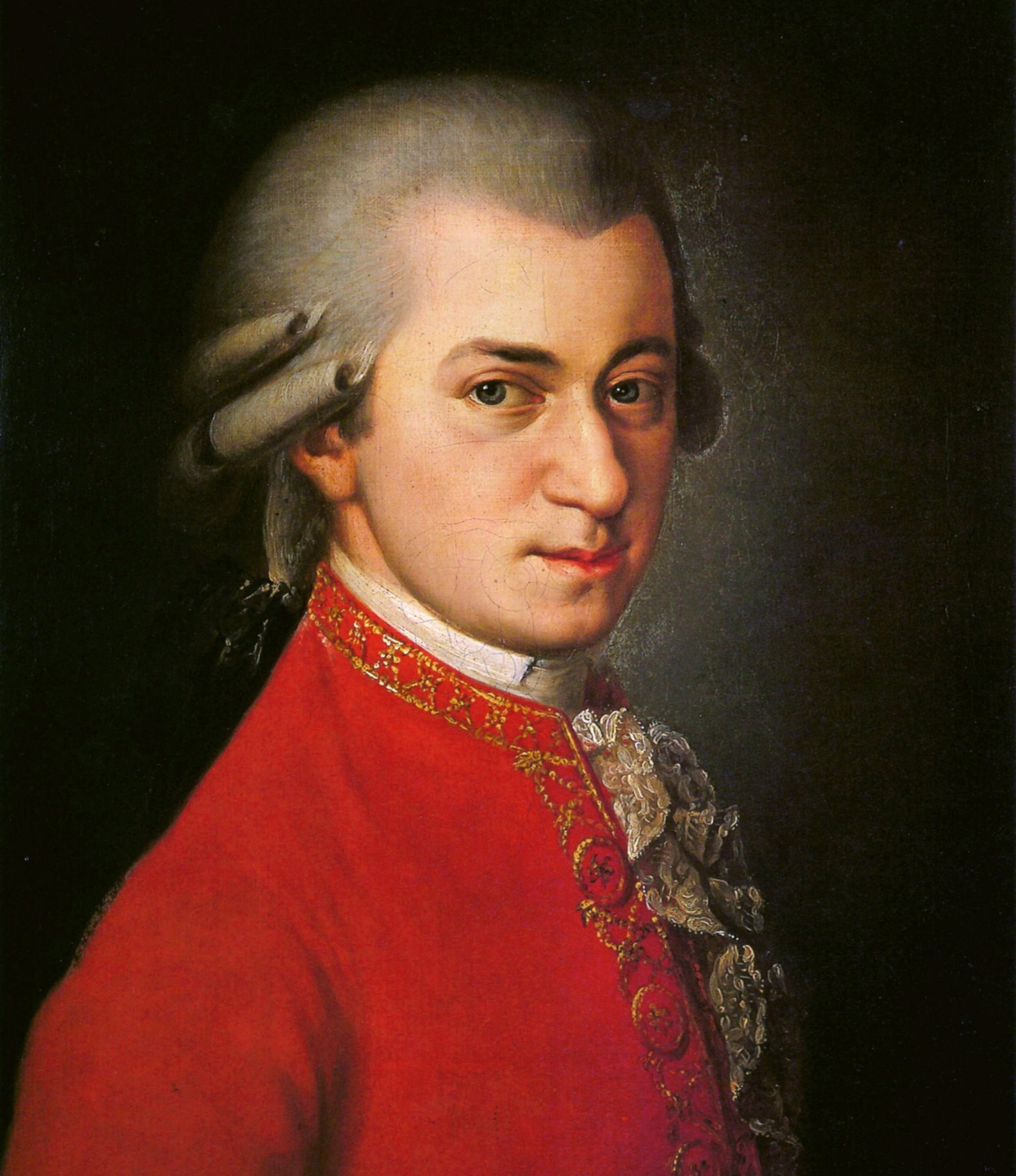
The youngest child and only surviving son of the Austrian composer Leopold Mozart, Wolfgang Amadeus received his early musical education from his father. His musical talent was evident from the very beginning, and as a result Mozart is considered one of the greatest musical geniuses of all.
At the age of six, Wolfgang and his very talented sister "Nannerl" went on their first major tour with their father to the most important ruling courts of Europe, where they delighted audiences with virtuoso concerts on the harpsichord. This concert tour was to be followed by many more. Of all the places where Mozart gave concerts during his travels, it was Italy where he received the greatest joy and recognition.
After that followed a rather disappointing period for father and son. As Mozart grew older, his popularity waned and he initially had trouble finding work. Eventually Mozart was offered the position of court and cathedral organist by the Prince-Archbishop of Salzburg. At the beginning of 1781, the commissioned work, the opera Idomeneo, was premiered in Munich for the Regent of Bavaria. The success of the opera strengthened Mozart's decision to move to Vienna, where he was favorably received by the nobility.
He thus spent the last ten years of his life, often in straitened financial circumstances, in Vienna with his wife, the singer Constanze Weber. Initial success with German and Italian opera and with a large number of concerts was followed by a period of great financial difficulties. Although this development had no direct effect on Mozart's music, it eventually destroyed his health. Mozart became seriously ill and died on the morning of December 5, 1791. Mozart was buried in an ordinary tombstone-less grave in Vienna, at the St. Marx cemetery.
Schedule
Thursday, 3 July 2025
Afternoon: rehearsal no. 1
Evening: welcome-reception in the roof atrium of St. Stephen’s
Friday, 4 July 2025
Morning: rehearsal no. 2
Afternoon: rehearsal no. 3
Saturday, 5 July 2025
Morning: dress rehearsal with the Vienna Cathedral Orchestra
Evening: festive concert at St. Stephen's Cathedral
Followed by: concert-reception
Erasmus Baumgartner
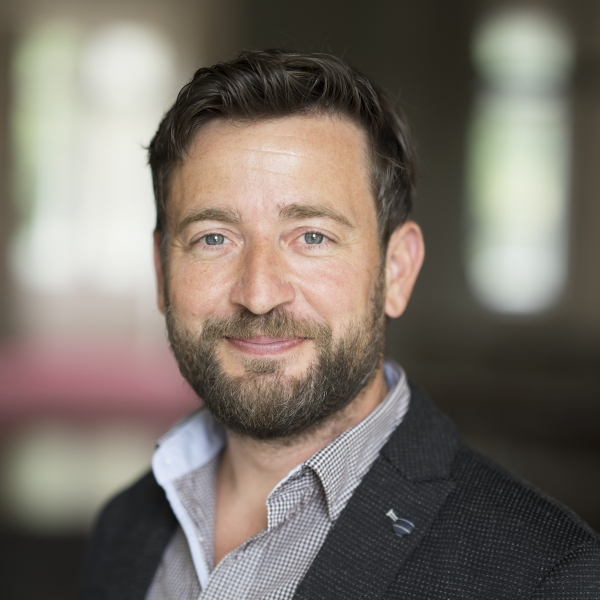
Vienna Boys Choir, Acting Artistic Director
Erasmus Baumgartner has been the Acting Artistic Director of the Vienna Boys Choir and Campus Augarten since fall 2023.
Erasmus Baumgartner received his first musical training as a choirboy at St. Florian Abbey in Upper Austria. At the age of 17, he began studying conducting and singing at the Anton Bruckner Private University in Linz, from which he graduated with distinction in 2002. He later completed a master's degree in instrumental and vocal pedagogy at the Mozarteum University in Salzburg, also with distinction.
Erasmus Baumgartner has taught at music schools and grammar schools, with the Vienna Boys' Choir and at the Vienna State Opera.
As a chorister, he sang at the Salzburg Festival: in 1987 as a choirboy under Herbert von Karajan and in 2008 as an adult under Seiji Ozawa and Franz Welser-Möst. While still a student, Baumgartner founded the internationally acclaimed "Academy Singers", a choir of 50 young singers from all over Upper Austria. From 2009 to 2012, he was the Artistic Director of the Juvenis choir in Schärding.
In 2014, he became assistant and deputy to Gerald Wirth.
Vienna Cathedral Orchestra
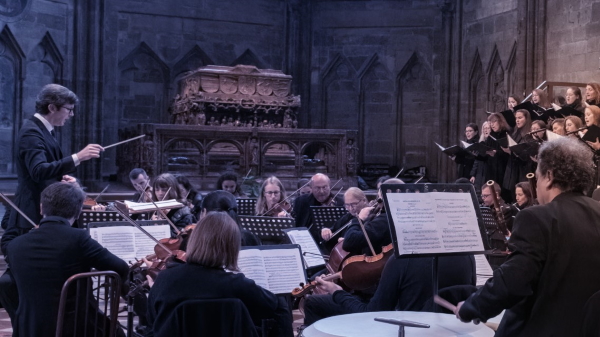 The Vienna Cathedral Orchestra is made up of musicians from all the major Viennese orchestras. The spectrum ranges from chamber music ensembles to the romantic symphony orchestra. At the Sunday High Masses, at many other services organized by the Cathedral Music, at special events and at the concerts of the Cathedral Music, the Cathedral Orchestra is the partner of soloists and choir.
The Vienna Cathedral Orchestra is made up of musicians from all the major Viennese orchestras. The spectrum ranges from chamber music ensembles to the romantic symphony orchestra. At the Sunday High Masses, at many other services organized by the Cathedral Music, at special events and at the concerts of the Cathedral Music, the Cathedral Orchestra is the partner of soloists and choir.
The history of music in St. Stephen's Cathedral probably goes back as far as liturgy has been celebrated in this church, i.e. at least 870 years! The first documented mention of the organized church music is in the abbey letter of Duke Rudolf IV from the year 1365, in which in connection with the establishment of a collegiate chapter (today's cathedral chapter) also a cantor is mentioned, who was responsible for choirmaster, choristers and pupils (Stephaner Sängerknaben). Among the prominent musicians who were active at St. Stephen's Cathedral, Johann Joseph Fux, the brothers Michael and Joseph Haydn, and Wolfgang Amadé Mozart may be mentioned.
Concert at St. Stephen's Cathedral
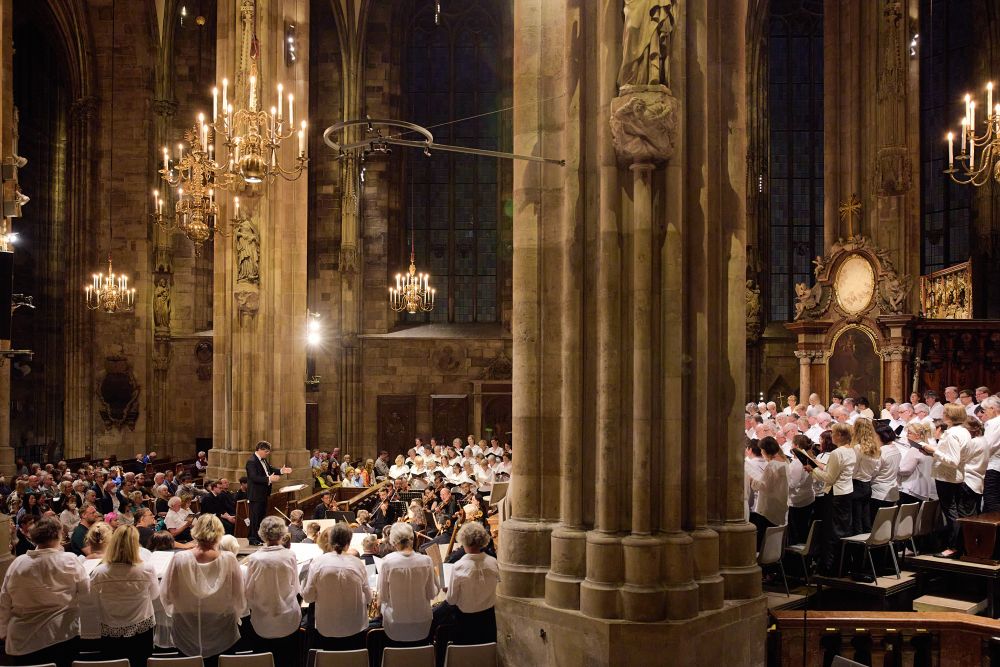 The grand finale of the 43rd Sing Along! Choir Festival is the performance of the Requiem in St. Stephen's Cathedral. In this way, you continue the tradition of music in the cathedral and follow in the footsteps of great composers. It was in St. Stephen's Cathedral that Joseph and his brother Michael Haydn received extensive musical training as choirboys. Joseph Haydn married here, as did Johann Strauss and Wolfgang Amadeus Mozart. For Mozart, St. Stephen's Cathedral played an important role throughout his life, especially when he lived in the nearby Figaro House, but also after his death: He married Constanze Weber here, had two of his children baptized in the cathedral and a few months before his death, Mozart applied for the position of music director adjunct at St. Stephen's. Mozart's name can be found both in the record of his death and in the cathedral's Book of Death Fees. Apart from Mozart, Antonio Vivaldi, Christoph Willibald Gluck, Antonio Salieri, Franz Schubert and Wolfgang Amadeus Mozart are also recorded here in the Book of the Dead.
The grand finale of the 43rd Sing Along! Choir Festival is the performance of the Requiem in St. Stephen's Cathedral. In this way, you continue the tradition of music in the cathedral and follow in the footsteps of great composers. It was in St. Stephen's Cathedral that Joseph and his brother Michael Haydn received extensive musical training as choirboys. Joseph Haydn married here, as did Johann Strauss and Wolfgang Amadeus Mozart. For Mozart, St. Stephen's Cathedral played an important role throughout his life, especially when he lived in the nearby Figaro House, but also after his death: He married Constanze Weber here, had two of his children baptized in the cathedral and a few months before his death, Mozart applied for the position of music director adjunct at St. Stephen's. Mozart's name can be found both in the record of his death and in the cathedral's Book of Death Fees. Apart from Mozart, Antonio Vivaldi, Christoph Willibald Gluck, Antonio Salieri, Franz Schubert and Wolfgang Amadeus Mozart are also recorded here in the Book of the Dead.
Scores and Practicing
You can add the scores for the piece to your registration when booking. We will use the Carus edition at the Sing Along! Choir Festival. Within Europe we will be happy to send the scores to you in early April. Order deadline is March 31st 2025.
If you already have the scores or prefer to order them yourself, you can find the edition directly at Carus: Mozart Requiem: Carus 51.626/05
You will receive the scores for the additional piece by e-mail in mid February 2025 (after registration).
J. Haydn: Harmoniemesse
10 to 12 July 2025 | St. Stephen's Cathedral, Vienna
Registration for "Haydn, Harmoniemesse" in Vienna is closed!
Sing Joseph Haydn's Harmoniemesse as part of the Sing Along! Festival Choir in St Stephen's Cathedral in Vienna, where he sang as a chapel boy and married his wife Aloysia a few years later. The Harmoniemesse is Haydn's last of his six great masses and his last composition ever, with which - alongside The Creation and The Seasons - his choral work came to a crowning conclusion.
You will rehearse the work together with a short composition by his brother Michael over several days in workshops under the direction of Prof. János Czifra. They then perform it as part of the Sing Along! festival choir in a large evening concert in St Stephen's Cathedral in Vienna, accompanied by the Vienna Cathedral Orchestra and renowned soloists.
Repertoire and Composers
Repertoire
J. Haydn: Harmoniemesse (Hob. XXII: 14)
Joseph Haydn's Harmoniemesse in B flat major (Hob. XXII:14) is his last major sacred work and a worthy conclusion to his church music career. First performed in 1802, the mass is one of the six late masses that Haydn composed for Prince Nikolaus II Esterházy. The name “Harmoniemesse” is not derived from a particular harmony, but from the prominent use of wind instruments (“Harmoniemusik”), which develop a festive and sonorous character in combination with the choir and orchestra. The Harmoniemesse, characterized by the mastery of a mature Haydn, is unmistakably rich both musically and emotionally. It combines the joy of creating music with a deeply rooted faith.
The Harmoniemesse is characterized by an unusual orchestral, extensive woodwind and brass instrumentation, which gives it a luminous and often solemn sound. Haydn uses the different timbres of the winds to express emotional depth and spiritual grandeur, especially in the interplay with the choir and soloist quartet. The mass follows the traditional liturgical structure - Kyrie, Gloria, Credo, Sanctus, Benedictus and Agnus Dei - and manages to combine the sacred and solemn with a human warmth and confidence.
Each of the parts has its own characteristic themes and musical nuances: The Kyrie has a modest, almost intimate beginning, which shapes the pleas of “Lord, have mercy” in a haunting, calm dialog between choir and soloists. In the Gloria, Haydn focuses on jubilation and dynamics. The choir and orchestra unleash their full power to make the praise of God musically lively and captivating. In the Credo, the profession of faith is set to music in a solemn tone and partly polyphonic structure. While the Sanctus evokes a sublime atmosphere, the Benedictus has a particularly tender and lyrical character. The final section, the Agnus Dei, gives the mass a hopeful, comforting note, which ultimately brings the Harmoniemesse to a peaceful close.
M. Haydn: Tres sunt qui testimonium dant (MH 183
As a short 4.5-minute additional work, we will sing Michael Haydn's “Tres sunt qui testimonium dant”. You will receive the sheet music with your registration. There are no practice parts or recordings of the work, but János Czifra is looking forward to practicing the work with the participants.
Composers
Joseph Haydn (1732-1809)
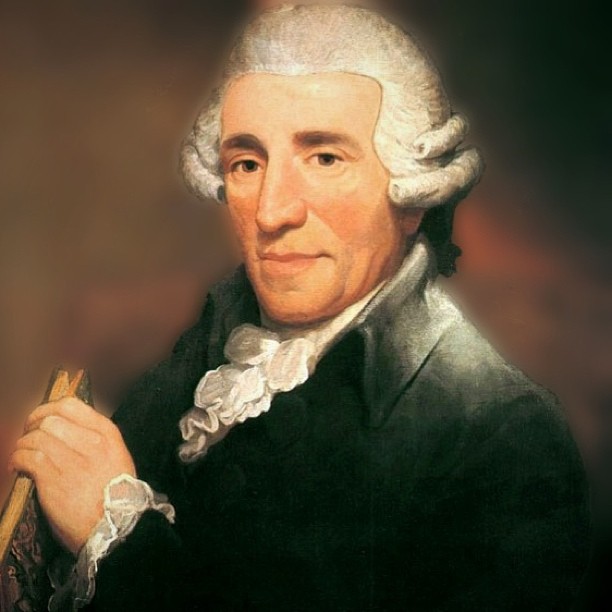
Joseph Haydn was born on 31 March 1732 into a musical family living in poor circumstances in Rohrau (Lower Austria). At the age of eight, he came to St Stephen's as a choirboy. After his voice broke, he left the choir. Over the next ten years, he worked as a music teacher and repetiteur and helped out as a singer at masses on Sundays and public holidays. He became valet de chambre and accompanist to the Italian composer Nicola Porpora and lived in dreary conditions in a flat on Michaelerplatz. In 1759, at the age of 26, Haydn became music director and composer at the court of Prince Morzin, for whom he wrote his first symphonies and instrumental works. In 1761 he came to the court of the Esterházys, a very wealthy aristocratic family. There he developed his own style and experimented with the newly emerging style of Viennese Classicism.
In his younger years, Haydn mainly wrote instrumental music for the prince's table music and the concerts that took place every fortnight. He also wrote around 125 trios in ten years for the prince's instrument, the baryton. Nikolaus (Prince Miklós) Esterházy died in 1790 and his son Prince Antal had no interest in music. Despite this, Haydn remained in his service, but had the freedom to move to Vienna and travel.
During his first trip to London in 1791-1792, he was awarded an honorary doctorate by Oxford University. Haydn composed his last twelve symphonies, the so-called Salomon or London Symphonies, for performances in London, which were great successes. Haydn spent the last ten years of his life in Vienna and wrote a large number of masses in the Austrian mass tradition.
Following this great success, Haydn composed The Seasons (1799-1801), which he completed at the age of 67. This work not only marked the beginning of a new century, but also the transition from objective classicism to more subjective romanticism. Haydn died peacefully on 31 May 1809 in Vienna, where many of his admirers kept vigil in front of his house.
Michael Haydn (1737-1806)
Michael Haydn was born on 14 Sept. 1737 in Rohrau, Lower Austria. After attending school in Hainburg, he was a choirboy at St Stephen's in Vienna, where he learnt the basics of theory as well as playing the violin and piano. As early as 1754, he composed the Trinity Mass, which is Haydn's first surviving composition. At the age of 20, Michael was employed by the Bishop of Großwardein and was appointed Kapellmeister in 1760.
In 1763, Michael Haydn came to Salzburg and remained there until his death. He entered the service of Prince-Archbishop Sigismund Count von Schrattenbach as ‘court musician and concertmaster’. In accordance with his function, he initially wrote instrumental music (symphonies, concertos, serenades, chamber music), as well as smaller church works and later operas. Michael Haydn wrote the sacred singspiel Die Schuldigkeit des ersten Gebots (Part 1) together with his colleagues Wolfgang A. Mozart and Cajetan Adlgasser.
The accession to power of Prince Archbishop Hieronymus Count Colloredo in 1772 brought major changes to the city's musical life, which meant that church music became the centre of Haydn's work. After he had created his Requiem in C minor as an exemplary work, the Hieronymus Mass followed in 1777 and the Rupertus Mass in 1782. After the death of the court organist, Haydn also took over the organist duties at the Holy Trinity Church and in 1782 - as the successor to Wolfgang A. Mozart - the function of court and cathedral organist and taught theory and composition to the cathedral choirboys at the Kapellhaus. In 1783, he was commissioned to replace the epistle sonatas customary at the cathedral with liturgical compositions (gradualia). At the same time, he revised the Salzburg church hymnal ‘Der hl. Gesang zum Gottesdienste in der r.k. Church’ and wrote German church music. Composition commissions from European royal courts (Spain: Missa a due cori; Imperial Court in Vienna: Theresien-Messe, Franciscus-Messe, Te Deum) and his appointment as a foreign member of the Royal Swedish Academy of Music (1804) document Haydn's recognition far beyond regional borders.
Michael Haydn died in 1806 at the age of 69 while composing his second Requiem and was buried in the cemetery of St Peter's in Salzburg.
Schedule
Thursday, 10 July 2025
Afternoon: rehearsal no. 1
Evening: welcome-reception in the roof atrium of St. Stephen’s
Friday, 11 July 2025
Morning: rehearsal no. 2
Afternoon: rehearsal no. 3
Saturday, 12 July 2025
Morning: dress rehearsal with the Vienna Cathedral Orchestra
Evening: festive concert at St. Stephen's Cathedral
Followed by: concert-reception
János Czifra

Salzburg Cathedral, Former Domkapellmeister
Prof. János Czifra was born in Budapest in 1951, where he received his basic musical training. After graduating in architecture from the Technical University in Budapest, he was accepted to the Franz Liszt Academy, where he obtained a diploma in choral conducting and music education in 1980. He then began his studies at the Mozarteum Academy of Music, where he graduated in 1982 with a diploma in conducting and later in church music.
He worked as a conductor at the Szent Imre Parish Church in Budapest and at the Györ State Theater (Hungary). He was appointed head of the diocesan church music department in 1983. From 1988 to 2004 he directed the Salzburger Liedertafel. From 1987 to 2022 he was Domkapellmeister at Salzburg Cathedral.
As a conductor, he has given concerts in Europe, America and Japan and is also active as a juror and course director. He has performed with the Salzburg Cathedral Orchestra at the Salzburg Mozart Week, the Salzburg Culture Days and numerous festivals in Germany, Hungary, Italy and Austria.
Vienna Cathedral Orchestra
 The Vienna Cathedral Orchestra is made up of musicians from all the major Viennese orchestras. The spectrum ranges from chamber music ensembles to the romantic symphony orchestra. At the Sunday High Masses, at many other services organized by the Cathedral Music, at special events and at the concerts of the Cathedral Music, the Cathedral Orchestra is the partner of soloists and choir.
The Vienna Cathedral Orchestra is made up of musicians from all the major Viennese orchestras. The spectrum ranges from chamber music ensembles to the romantic symphony orchestra. At the Sunday High Masses, at many other services organized by the Cathedral Music, at special events and at the concerts of the Cathedral Music, the Cathedral Orchestra is the partner of soloists and choir.
The history of music in St. Stephen's Cathedral probably goes back as far as liturgy has been celebrated in this church, i.e. at least 870 years! The first documented mention of the organized church music is in the abbey letter of Duke Rudolf IV from the year 1365, in which in connection with the establishment of a collegiate chapter (today's cathedral chapter) also a cantor is mentioned, who was responsible for choirmaster, choristers and pupils (Stephaner Sängerknaben). Among the prominent musicians who were active at St. Stephen's Cathedral, Johann Joseph Fux, the brothers Michael and Joseph Haydn, and Wolfgang Amadé Mozart may be mentioned.
Concert at St. Stephen's Cathedral
 The grand finale of the 44th Sing Along! Choir Festival is the performance of the Harmoniemesse in St. Stephen's Cathedral. In this way, you continue the tradition of music in the cathedral and follow in the footsteps of great composers. It was in St. Stephen's Cathedral that Joseph and his brother Michael Haydn received extensive musical training as choirboys. Joseph Haydn married here, as did Johann Strauss and Wolfgang Amadeus Mozart. For Mozart, St. Stephen's Cathedral played an important role throughout his life, especially when he lived in the nearby Figaro House, but also after his death: He married Constanze Weber here, had two of his children baptized in the cathedral and a few months before his death, Mozart applied for the position of music director adjunct at St. Stephen's. Mozart's name can be found both in the record of his death and in the cathedral's Book of Death Fees. Apart from Mozart, Antonio Vivaldi, Christoph Willibald Gluck, Antonio Salieri, Franz Schubert and Wolfgang Amadeus Mozart are also recorded here in the Book of the Dead.
The grand finale of the 44th Sing Along! Choir Festival is the performance of the Harmoniemesse in St. Stephen's Cathedral. In this way, you continue the tradition of music in the cathedral and follow in the footsteps of great composers. It was in St. Stephen's Cathedral that Joseph and his brother Michael Haydn received extensive musical training as choirboys. Joseph Haydn married here, as did Johann Strauss and Wolfgang Amadeus Mozart. For Mozart, St. Stephen's Cathedral played an important role throughout his life, especially when he lived in the nearby Figaro House, but also after his death: He married Constanze Weber here, had two of his children baptized in the cathedral and a few months before his death, Mozart applied for the position of music director adjunct at St. Stephen's. Mozart's name can be found both in the record of his death and in the cathedral's Book of Death Fees. Apart from Mozart, Antonio Vivaldi, Christoph Willibald Gluck, Antonio Salieri, Franz Schubert and Wolfgang Amadeus Mozart are also recorded here in the Book of the Dead.
Scores and Practicing
You can add the scores for the piece to your registration when booking. We will use the Carus edition at the Sing Along! Choir Festival. Within Europe we will be happy to send the scores to you in early April. Order deadline is March 31st 2025.
If you already have the scores or prefer to order them yourself, you can find the edition directly at Carus: Haydn Harmoniemesse: Carus 40.612/05
You will receive the scores for the additional piece by e-mail in mid February 2025 (after registration).
W. A. Mozart: Requiem
31 Oct. to 1 Nov. 2025 | Salzburg Cathedral, Salzburg
Registration for "Mozart, Requiem" in Salzburg is closed as the maximum number of participants has been reached!
Perform Mozart's Requiem in Salzburg Cathedral as a sing-along concert. The myths surrounding Mozart's last composition contribute to the incredible appeal of this masterpiece. In 2025, you will once again have the opportunity to work on one of Mozart's great choral works in the city where he was born.
At the Sing Along! Choir Festival, you will work on the piece in two-day workshops under the direction of Erasmus Baumgartner and then perform it together with the Salzburg Cathedral Orchestra and renowned soloists in a festive final concert in Salzburg Cathedral.
Repertoire and Composer
Repertoire
W. A. Mozart: Requiem (KV 626, Süßmair Version)
When Wolfgang Amadé Mozart died on 5 December 1791, he left his Requiem in D minor (K. 626) unfinished. By the time of his death on 5 December 1791, he had only written down the opening movement of the Introit (Requiem aeternam) with all the orchestral and vocal parts. The following Kyrie and most of the Dies irae sequence (from the Dies irae to the Confutatis) were completed only in the vocal parts and the figured bass; in addition, some important orchestral parts (such as the trombone solo in the Tuba mirum, and more often the voice of the first violins) were briefly sketched. The last movement of the sequence, the Lacrimosa, broke off after eight bars and remained incomplete. The following two movements of the Offertory, the Domine Jesu Christe and the Hostias, were again elaborated in the vocal parts and partly in the continuo.
Through intermediaries acting for the eccentric Count Franz von Walsegg, Mozart was commissioned to compose a Requiem. The Count, who was an amateur musician and often commissioned works only to pass them off as his own composition (a practice that was widespread at the time), requested a Requiem to be performed in memory of his recently deceased wife. Mozart received half the payment in advance, so after Mozart's death his widow Konstanze was keen to have the work completed quickly and secretly by someone else so that she could deliver it as Mozart's composition and collect the remaining payment. At first she turned to Joseph Eybler. He worked on the orchestration of the movements from the Dies irae to the Lacrimosa, but then returned the commission.
The work was then entrusted to Franz Xaver Süßmayr, composer and pupil of Mozart, who was able to draw on Eybler's work for the orchestration. Süßmayr completed the orchestration of the Sequence as well as the Offertory, finished the Lacrimosa and composed further movements: Sanctus, Benedictus and Agnus Dei. Then he completed the Communio (Lux aeterna) by repeating the two opening movements, which Mozart had still composed himself, and underlaying them with the text of the Lux aeterna.
The completed composition, begun by Mozart and largely completed by Süssmayr, was given to Count Franz von Walsegg with Mozart's forged signature and dated 1792. The confusion surrounding the circumstances of this Requiem composition was largely spread by Mozart's widow Konstanze herself. Konstanze had a difficult task ahead of her: she had to keep the secret that Mozart had died before completing the composition so that she could claim the balance of the payment for the commissioned work. For a time, she had to keep secret that Süssmayr was involved with the composition in order to make Count Walsegg believe that he had Mozart's work in his hands. After receiving the balance of the fee, she had to promote the work as Mozart's composition in order to continue to use it as a source of income for publications and performances. During this phase, it was still important to make the public believe that Mozart had composed the entire work himself in order to extract higher sums from publishers and public performances. It is thanks to Konstanze that the first half-truths and myths began to circulate almost immediately after Mozart's death. She claimed that Mozart had declared that he was writing the Requiem for himself and that he had been poisoned. His condition deteriorated and he began to complain of painful swelling of his body and high fever. Despite all this, Mozart continued to work on the Requiem and even on the last day of his life he explained to his assistant how he intended to end the work. Even in biographies written shortly after Mozart's death, there are numerous inconsistencies that make it almost impossible to solve all the mysteries surrounding Mozart's last composition.
Composers
Wolfgang Amadeus Mozart (1756-1791)

The youngest child and only surviving son of the Austrian composer Leopold Mozart, Wolfgang Amadeus received his early musical education from his father. His musical talent was evident from the very beginning, and as a result Mozart is considered one of the greatest musical geniuses of all.
At the age of six, Wolfgang and his very talented sister "Nannerl" went on their first major tour with their father to the most important ruling courts of Europe, where they delighted audiences with virtuoso concerts on the harpsichord. This concert tour was to be followed by many more. Of all the places where Mozart gave concerts during his travels, it was Italy where he received the greatest joy and recognition.
After that followed a rather disappointing period for father and son. As Mozart grew older, his popularity waned and he initially had trouble finding work. Eventually Mozart was offered the position of court and cathedral organist by the Prince-Archbishop of Salzburg. At the beginning of 1781, the commissioned work, the opera Idomeneo, was premiered in Munich for the Regent of Bavaria. The success of the opera strengthened Mozart's decision to move to Vienna, where he was favorably received by the nobility.
He thus spent the last ten years of his life, often in straitened financial circumstances, in Vienna with his wife, the singer Constanze Weber. Initial success with German and Italian opera and with a large number of concerts was followed by a period of great financial difficulties. Although this development had no direct effect on Mozart's music, it eventually destroyed his health. Mozart became seriously ill and died on the morning of December 5, 1791. Mozart was buried in an ordinary tombstone-less grave in Vienna, at the St. Marx cemetery.
Schedule
Friday, 31 October 2025
Morning: rehearsal no. 1
Afternoon: rehearsal no. 2
Evening: welcome-reception
Saturday, 1 November 2025
Afternoon: dress rehearsal with the Salzburg Cathedral Orchestra
Evening: festive concert at Salzburg Cathedral
Followed by: concert-reception
Erasmus Baumgartner

Vienna Boys Choir, Acting Artistic Director
Erasmus Baumgartner has been the Acting Artistic Director of the Vienna Boys Choir and Campus Augarten since fall 2023.
Erasmus Baumgartner received his first musical training as a choirboy at St. Florian Abbey in Upper Austria. At the age of 17, he began studying conducting and singing at the Anton Bruckner Private University in Linz, from which he graduated with distinction in 2002. He later completed a master's degree in instrumental and vocal pedagogy at the Mozarteum University in Salzburg, also with distinction.
Erasmus Baumgartner has taught at music schools and grammar schools, with the Vienna Boys Choir and at the Vienna State Opera.
As a chorister, he sang at the Salzburg Festival: in 1987 as a choirboy under Herbert von Karajan and in 2008 as an adult under Seiji Ozawa and Franz Welser-Möst. While still a student, Baumgartner founded the internationally acclaimed "Academy Singers", a choir of 50 young singers from all over Upper Austria. From 2009 to 2012, he was the Artistic Director of the Juvenis choir in Schärding.
In 2014, he became assistant and deputy to Gerald Wirth.
Salzburg Cathedral Orchestra
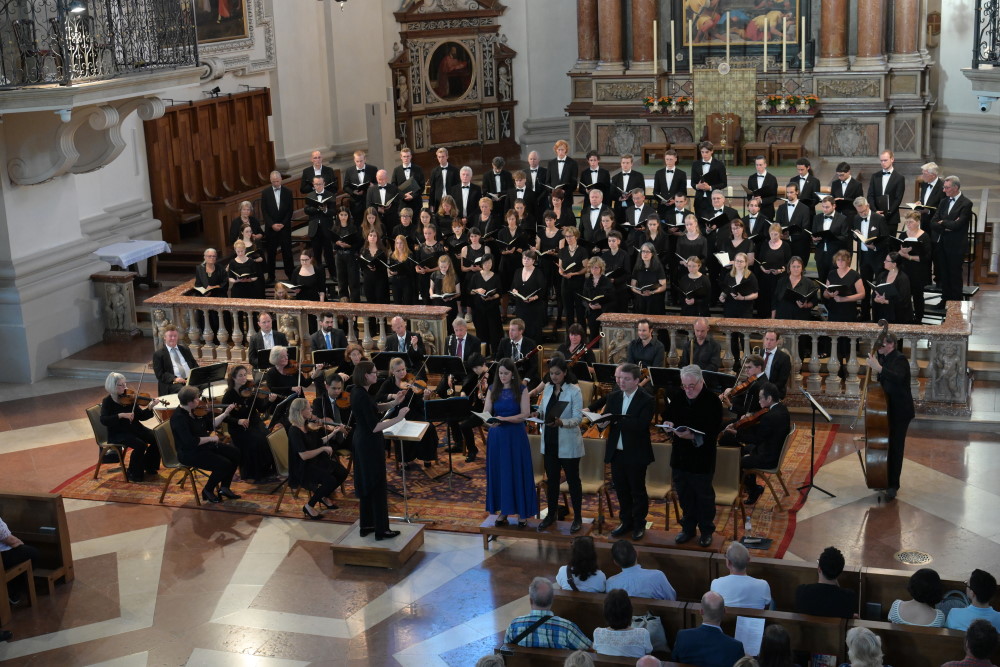 The Salzburg Cathedral Music has a tradition of more than 600 years. In 1393, Archbishop Pilgrim founded the "Salzburger Cantorey" to cultivate polyphonic church music. After the construction of the present cathedral (1628), the cultivation of church music reached its first peak through the activities of the composers Heinrich Ignaz Franz Biber and Georg Muffat, who died 300 years ago. Until the end of the 18th century, the most famous musician of this city, Wolfgang Amadé Mozart, worked in the circle of his father Leopold. The "Salzburg" Haydn, Johann Michael, (the younger brother of the world-famous Joseph Haydn) directed the prince-archbishop's chapel house, which was built for the young singers. After secularization in 1816, the court music was disbanded. The necessity of re-establishing an institute for the cultivation of church music led to the founding of the "Dommusikverein" and "Mozarteum" by Johann Cardinal Schwarzenberg in 1841.
The Salzburg Cathedral Music has a tradition of more than 600 years. In 1393, Archbishop Pilgrim founded the "Salzburger Cantorey" to cultivate polyphonic church music. After the construction of the present cathedral (1628), the cultivation of church music reached its first peak through the activities of the composers Heinrich Ignaz Franz Biber and Georg Muffat, who died 300 years ago. Until the end of the 18th century, the most famous musician of this city, Wolfgang Amadé Mozart, worked in the circle of his father Leopold. The "Salzburg" Haydn, Johann Michael, (the younger brother of the world-famous Joseph Haydn) directed the prince-archbishop's chapel house, which was built for the young singers. After secularization in 1816, the court music was disbanded. The necessity of re-establishing an institute for the cultivation of church music led to the founding of the "Dommusikverein" and "Mozarteum" by Johann Cardinal Schwarzenberg in 1841.
Salzburg Cathedral Music includes the Cathedral Choir in various groups (Great Choir, Chamber Choir, Vocal Ensemble), the youth choirs of the Cathedral Music, the soloists and the orchestra of the Cathedral Music, altogether more than 200 members. In order to fulfill the diverse tasks in the liturgy and in the concerts, a lively rehearsal activity is necessary. In addition, the five organ lofts with the instruments in the cathedral offer a unique opportunity for musical practice. The ensembles of the Cathedral Music have led concert tours to many cities in Europe and overseas, and they are always represented at numerous festivals abroad.
Concert at Salzburg Cathedral
The grand finale of the 45th Sing Along! Choir Festival is the performance of the Requiem in Salzburg Cathedral. Considering the outstanding role Salzburg Cathedral plays in music, it is exhilarating to continue this with the Sing Along! Choir Festivals. Wolfgang Amadeus Mozart and Salzburg are closely connected, as he was born and grew up here. Even today, the baptismal font where Mozart was baptized is still in use in Salzburg Cathedral. Mozart was in the service of the Salzburg court music chapel as court concertmaster and court organist for about 10 years in total between 1769 and 1781. Many of his most important church music works were composed for Salzburg Cathedral, most of which were premiered here or are otherwise associated with Mozart's Salzburg period, including the Coronation Mass (K. 317), Credo Mass (K. 257), Missa solemnis (K. 337), Regina coeli (K. 276), Sparrow Mass (K. 220) and the Vesperae solennes de confessore (K. 339).
Scores and Practicing
You can add the scores for the piece to your registration when booking. We will use the Carus edition at the Sing Along! Choir Festival. Within Europe we will be happy to send the scores to you in early July. Order deadline is March 31st 2025.
Sing Along! History
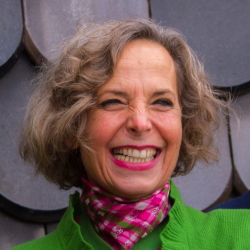
Co-Founder Sing Along! Choir Festivals
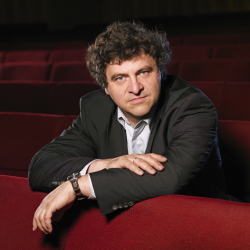
Artistic Director Sing Along! Choir Festivals 2006-2022
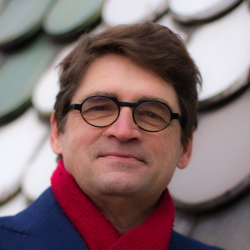
Co-Founder Sing Along! Choir Festivals
Since the Mozart Year 2006, singers from all over the world have come together every year to rehearse a great work of music history in joint workshops and to perform it in St. Stephen's Cathedral with soloists, choir and orchestra and to contribute to its preservation. The basic idea of the founders Theresa Konrad-Karsten, Herbert Konrad and Gerald Wirth was to offer every singer the opportunity to present a major choral work with a professional orchestra and renowned soloists in Austria's landmarks, St. Stephen's Cathedral in Vienna and Salzburg Cathedral.
The project was very well received right from the start. Many singers are already real “veterans”. They have been participating for many years in a row. So far, choirs and individual singers from Germany, Greece, China, Malta, Liechtenstein, New Zealand, Australia, Great Britain, the Netherlands, Italy, Ireland, Japan, the USA, Switzerland and from all over Austria have been welcomed. Gerald Wirth went into well-deserved retirement in 2024. He will continue to support us with his tireless commitment to choral music and his conviction that anyone and everyone can sing.
Stay Up To Date
Our newsletter keeps you well informed about the Sing Along! Choir Festivals.
Frequently Asked Questions
Tell me About the Sing Along! Choir Festivals?
The Sing Along! Choir Festivals are Sing Along Concerts, where important pieces for choir and orchestra are performed. The Sing Along! Festival Choir, which is newly formed for each piece, is composed of individual singers and choirs from all over the world, who register for a Choir Festival and prepare the respective work at home in advance. In several-day rehearsals with a renowned choirmaster, the fine-tuning takes place before the work is performed with a professional orchestra and renowned soloists in Vienna's St. Stephen's Cathedral or Salzburg Cathedral.
Who Can Participate in the Sing Along! Choir Festivals?
For the Sing Along! Choir Festivals both entire choirs and individual singers, both amateur singers and long-standing professionals can register. The singers rehearse the work in advance, the fine tuning is done in the rehearsals.
Can Groups and Choirs Register As Well?
We are also very happy to welcome groups and choirs to the Sing Along! Choir Festivals. For choir and group inquiries please contact us by e-mail to This email address is being protected from spambots. You need JavaScript enabled to view it.! You can also register your group or choir directly via our Online Registration System, in which case we will contact you with the details of your singers.
In Which Languages are the rehearsals Held?
Music is the universal language we all speak. Nevertheless, the rehearsals of the Sing Along! Choir Festivals are held bilingually in German and English.
Which Services are Included in the Participation Fee?
The participation fee includes the following services:
All rehearsals
Reception in the roof atrium of St. Stephen's Cathedral / in the Domchorsaal
Festive final concert in St. Stephen's Cathedral / Salzburg Cathedral
Reception after the concert with all artists
As a memory, 1 poster and 1 programme booklet mentioning the name of each participant
Are Auditions Necessary for Participating in the Sing Along! Choir Festivals?
We trust in your ability to judge whether you are capable of singing the respective choral piece. Should you be in doubt please write to This email address is being protected from spambots. You need JavaScript enabled to view it..
Do I have to prepare the work at home?
Yes, it is necessary that you prepare with the scores at home, in the rehearsals the finishing touches are made. Many choir singers use Carus Music / Choir Coach or other practice parts to rehearse the works.
Is the Number of Participants Limited?
Yes, the number of participants is limited depending on the piece performed. Registrations will be considered after receipt.
How Much is the Participation Fee?
The participation fee for the Sing Along! Choir Festivals in 2025 is € 130,- until December 31st 2024 (Early bird discount) and € 140,- from January 1st 2025.
Will the Scores for the Respective Piece be Sent Out?
Within Europe we will be happy to send you the appropriate scores from early April or from early July, which you can add to your registration. The order deadline is March 31st 2025. The costs for the scores and their shipping for the Sing Along! Choir Festivals are:
Mozart Requiem: € 18,-
Haydn Harmoniemesse: € 19,-
If you already have the scores or prefer to order them yourself, the publisher for all scores is Carus-Verlag:
Mozart Requiem: Carus 51.626/05
Haydn Harmoniemesse: Carus 40.612/05
Are Combi Reductions Available for Several Sing Along! Choir Festivals?
Many of our participants sign up for more than one Sing Along! Choir Festival. In this case you benefit from the following discounts.
Participation in two choir festivals: You receive a 10% discount on the participation fee
Participation in three choir festivals: You receive a 15% discount on the participation fee
What are the Cancellation Conditions?
Should you wish to cancel your fixed participation in the Sing Along! Choir Festival, the following cancellation conditions apply.
until 8 weeks before the choir festival: € 20,- cancellation fee
8 - 4 weeks before the choir festival: 50 % cancellation fee
3 - 1 weeks before the choir festival: 75 % cancellation fee
from 1 week before the choir festival: 100 % cancellation fee
In case of travel restrictions or a lockdown your cancellation and the refund are of course free of charge.
These cancellation conditions also apply to online bookings of your participation. The message "Tickets purchased online cannot be cancelled" displayed during the online booking process is an automated message that we unfortunately cannot change to the above cancellation conditions.
Please request the cancellation conditions for groups (from 10 persons) separately under This email address is being protected from spambots. You need JavaScript enabled to view it.
How does the Online Registration Work?
Via our Online Registration System you can complete your registration and also pay directly. The following steps are necessary:
-
Add a Registration Fee to the shopping cart, including scores if you need any. If you add a Combi-Registration for 2 choir festivals to your shopping cart, please choose your combination in the next step.
-
After you have chosen "Checkout", enter your data in the contact form. If you want to make a Combi-Registration for 2 choir festival participations please choose your desired combination here.
-
Click "Continue" to proceed to the online payment by bank transfer or credit card. After you have clicked on "Place Order and Charge my Account" you can complete the order.
-
You will receive an automated confirmation by e-mail, which also includes an Online Ticket that you can take with you to the Choir Festival as confirmation of your registration. Please note that you will only receive one Online Ticket, even if you have registered for a Comb-Registration; you are still registered for the Choir Festivals of your choice.
-
To provide you with a contact person in case of questions, we will nevertheless contact you personally.
I Made an Online Combi-Registration but Only Got One Ticket - am I Registered for Both or all 3 Choir Festivals?
Due to system restrictions it is unfortunately not possible to issue more than 1 ticket for an online combi-registration. In the lower part of the Online-Ticket you will find the combi-registration for 2 or 3 Choir Festivals indicated and you can take the ticket to both or all 3 events as confirmation. In our participant lists you are noted accordingly in any case.
How to Register by E-Mail?
You can also register by e-mail to This email address is being protected from spambots. You need JavaScript enabled to view it..Simply send us the completed registration form:
Registration form Mozart Requiem Vienna
Registration form Haydn Harmoniemesse Vienna
Registration form Mozart Requiem Salzburg

